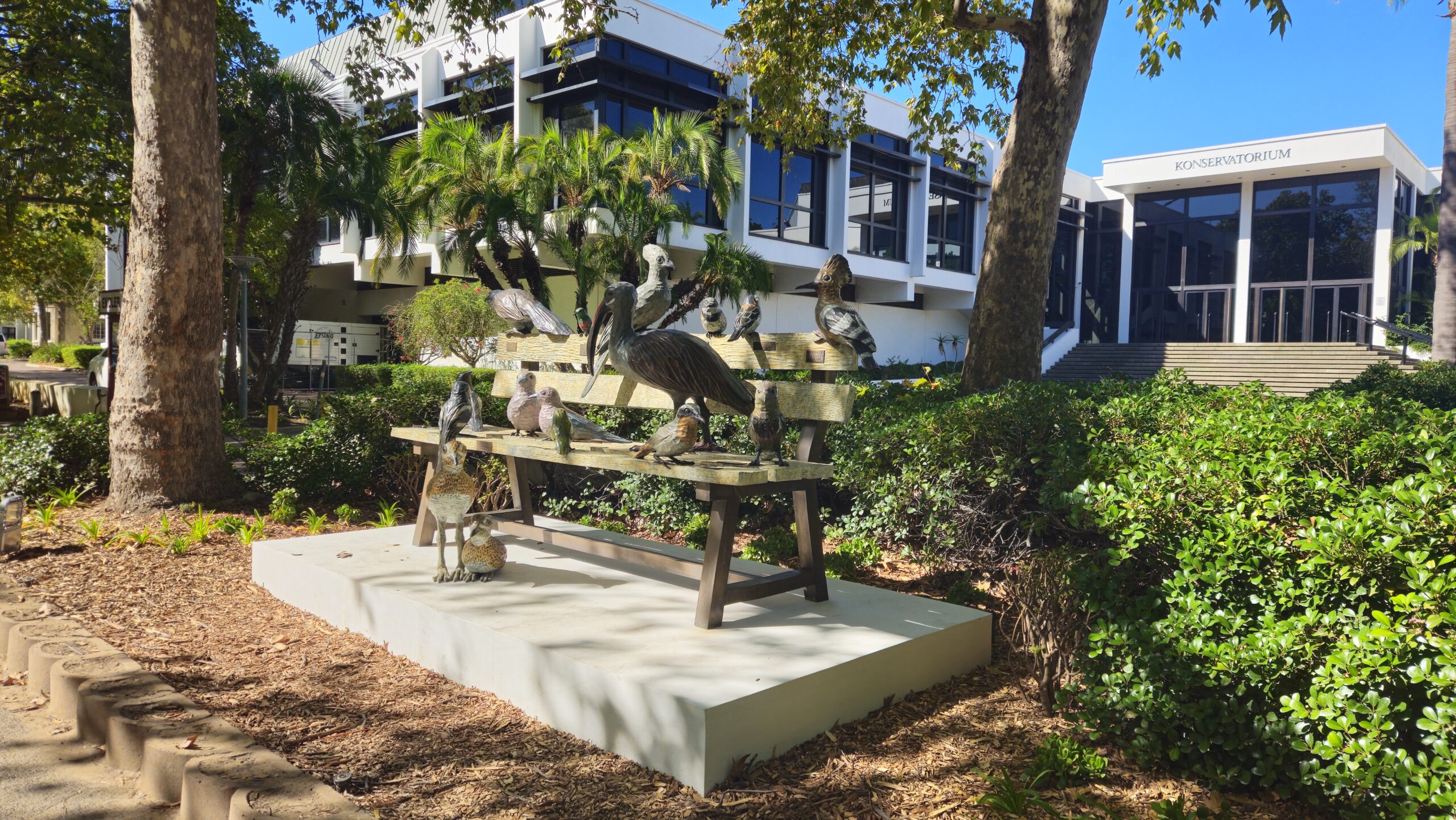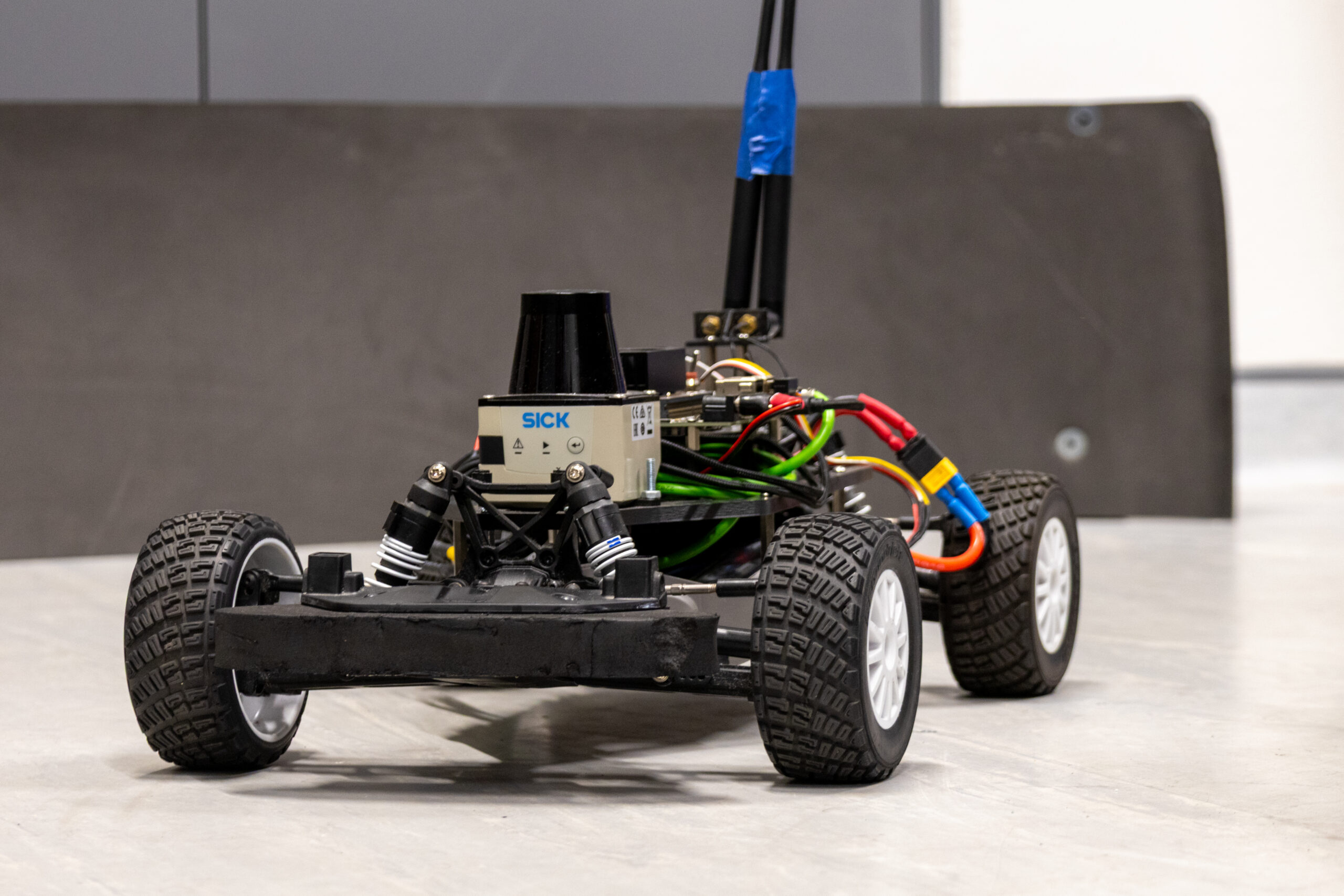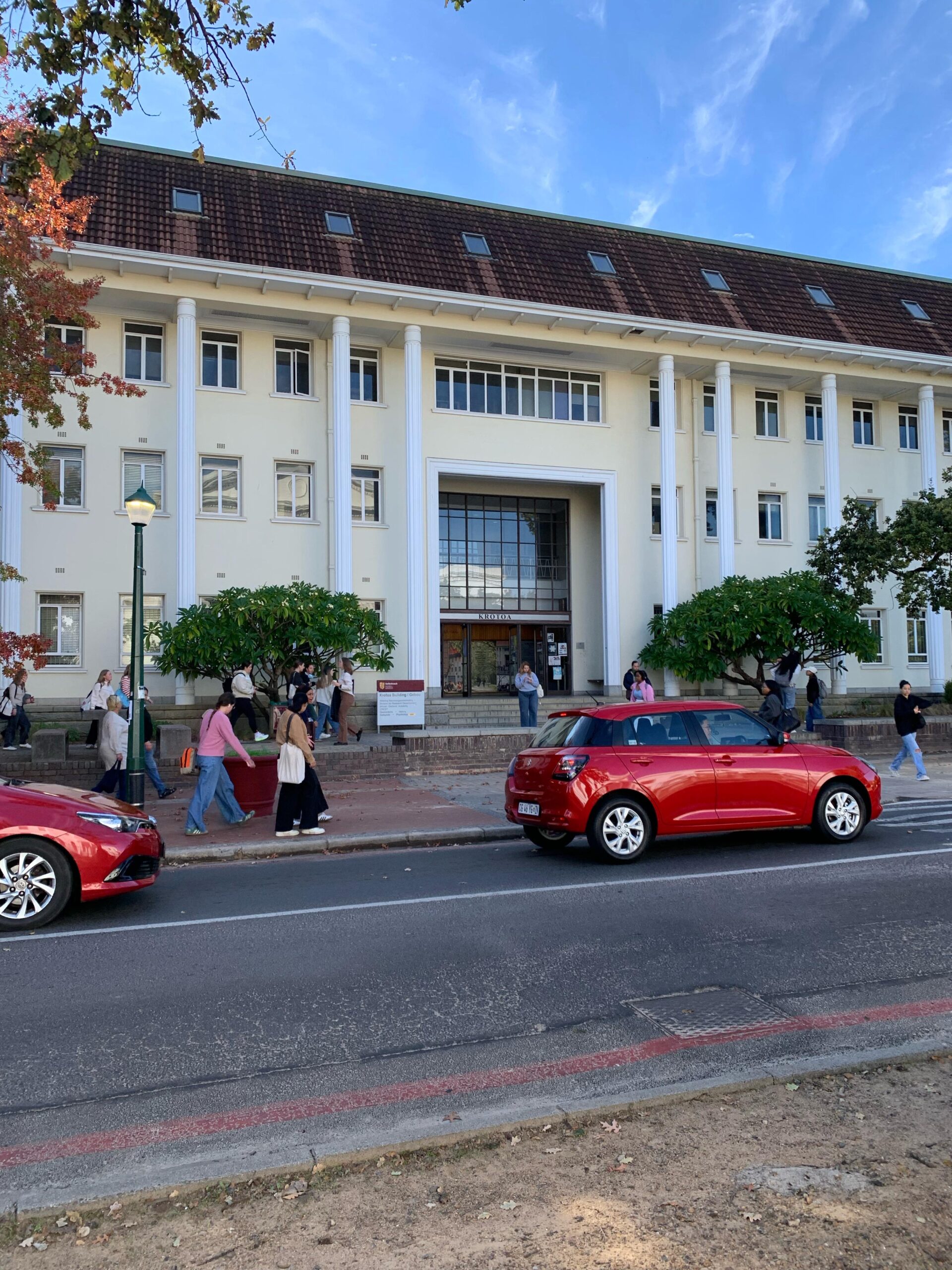by Skyla Thornton, Tiaan Booyens and Misha Fray
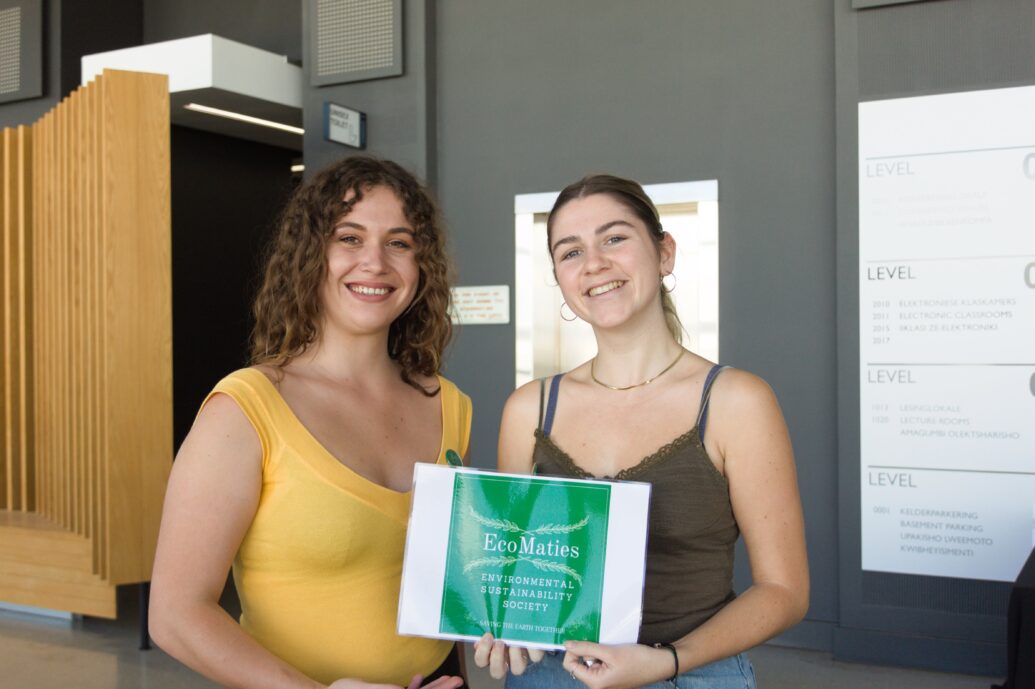
As Stellenbosch University (SU) attempts to reach carbon neutrality, many events were hosted in celebration of Earth Week, from 13 April to 22 April. Events were hosted and facilitated by Facilities Management, the Sustainable Development Goals (SDG) Hub and Student societies of EcoMaties and UNASA Stellenbosch (United Nations Association of South Africa), in collaboration with the School for Climate Studies and the Climate Justice Charter Movement (CJCM).
“The recognition and celebration of Earth week is a wonderful way to bring awareness to the importance of our actions as individuals and to remind ourselves of our vital role in protecting the future of our planet. Hosting events and displays during this week was the perfect opportunity to engage in thoughtful conversations with our fellow students,” said Megan Farquhar, Chairperson of EcoMaties.
To start the week off, The Environmental Sustainability team within Facilities Management held an exposition in Jan Mouton, with various organisations and societies on 13 and 14 April “to show what the university is doing to reduce the operational carbon footprint and Invest In Our Planet (the theme for this Earth Week),” said John de Wet, SU’s Environmental Sustainability Manager.
In addition to the expo, on 13 April (Thursday), a seminar titled ‘How to avoid dangerous climate change: an African perspective’ was held with guest speaker Professor Guy Midgley, Acting Director for School for Climate Studies.
“The diverse range of activities that took place during Earth week shows that SU students are uncompromising on their dreams for a just climate future. It also marks their demand to co-create the future of SU, and to not be left on the sidelines by management,” said Dr Matthew Wingfield, climate activist and SU lecturer of Social Anthropology. Memorably, Professor Midgely commented on “the echo of bad decisions,” referring to the sound of the generators kicking in with loadshedding. The seminar was well attended by students and staff alike, and had an interactive element as well.
An African perspective of climate change was heavily emphasised, because Africa as a continent will face the “earliest and worst adverse impacts of the climate crisis,” said Professor Midgely. Professor Midgely ended the session with a plea to the collective body of students and staff to “be well informed and put pressure” to make change, as “the climate crisis is the challenge of our time”.
On 14 April, there was a panel discussion held in the Jan Mouton Learning Centre titled ‘Integrating sustainability in research’. The panellists included Dr Christian Lueme from SU’s Department of Family Medicine and Primary Care, whose research is laden with climate resilience and planetary health; Ms Yenziwe Mbuyisa, MSc student and GAUC (Global Alliance of Universities on Climate) ambassador and Dr Jason Samuels from GreenX, an engineering company with a focus on energy efficiency in South African schools.
Due to time constraints, the session functioned more as a series of short talks as opposed to a panel discussion, but the main message was that there is a place for a sustainability approach in all sectors of research, as Mbuyisa said in her presentation, researchers can“come from anywhere and work towards sustainability”. A Climate Justice workshop was held in the Natural Sciences building on 18 April, presented by the CJCM and in association with UNASA. The workshop set out to create conversations around Climate Justice and The Deep Just Transition, as well as give students an opportunity to further their understanding of the climate crisis and to equip them with tools to be more effective and meaningful activists.
Dr Matthew Wingfield, as a representative of the CJCM, facilitated the workshop. This event also served as a follow-up from a conference held in Johannesburg on 23 and 24 March, which invited young activists, environmental and faith-based organisations, academics, community leaders and labour unions from across South Africa to discuss a plan for an alternative future for the country. The workshop was at full capacity, and saw great engagement amongst the participants.
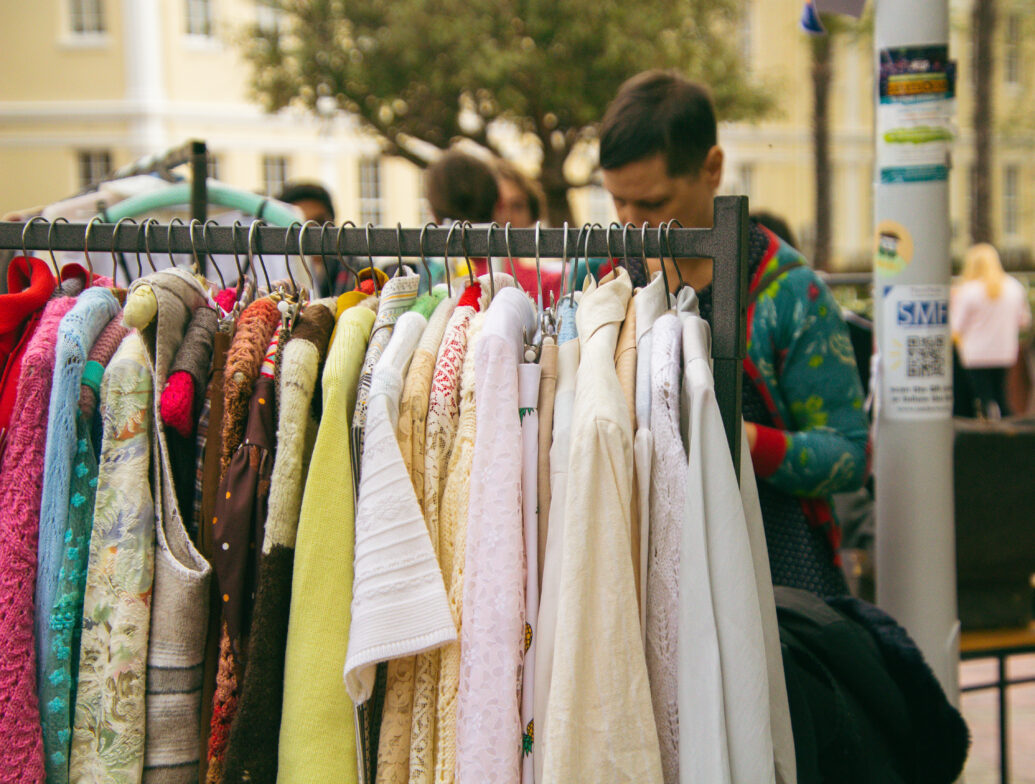
On 19 April (Wednesday), UNASA hosted a clothing swap at CoCreate Hub in collaboration with EcoMaties. The event was buzzing with interest and enthusiasm, with delicious wraps on sale by Indaldo Street Food. “This is my first clothing swap, because Stellenbosch doesn’t have many thrifting options so I really hope to see something like this happen again,” said a participant at the clothing swap. A clothing swap is an event where one donates old clothes in good condition, and in exchange for each item of clothing they are credited with a token (at this clothing swap the token was a bean). Each token can then be exchanged for any item that someone else brought to the clothing swap. At the end of it all, the leftover clothes are donated.
Sustainability was the focus of the event and Tegan Gibaud, head of SDGs at UNASA said, “it’s events like these that show you that you can be directly involved in making decisions towards creating a better future”.
Gibaud added, “Education around the fast fashion industry and the solutions of slow fashion is very important if moving towards a sustainable future is the goal. Slow fashion is upcycling, attending clothing swaps and participating in a circular economy.”
EcoMaties held a quiz night at Courtyard Cafe on Thursday evening. The event was vibrant, and the hosts Megan Farquhar and Anaïs Breytenbach kept those who attended eager and curious, as the questions asked ranged from climate change to biodiversity. The winners of the quiz won a R500 voucher to use at Courtyard Cafe that evening.
“The highlight of Earth Week for me was the amount of students that were fascinated by the biodiversity quiz that was held in the container. The engagement from students at our university is sometimes lacking, and I wish that every student was as passionate about environmental topics, as myself and the fellow Earth week organisers are, but it gives me hope after this week, that with more activities and initiatives, more students will want to involve themselves in environmental activism.” Said Farquhar.
A seminar titled ‘China’s just, equitable and fair transition to decarbonisation in an ESG (Environmental, Social, Governance) Context: Challenges and Opportunities in Africa by Qingxiu Bu’ was held in the Jan Mouton Learning Centre on Thursday. Bu is a research fellow, and spoke on China’s plan to reach net-zero by 2060.
Khia van der Meulen, a BSc Biodiversity and Ecology student attended the seminar and shared her thoughts, “Based on the fact that [China is] turning out 40-50 gigawatts of renewable energy annually, one hopes that these lessons learned by China can be applied in the inner workings of other countries, like South Africa,” said van der Meulen.
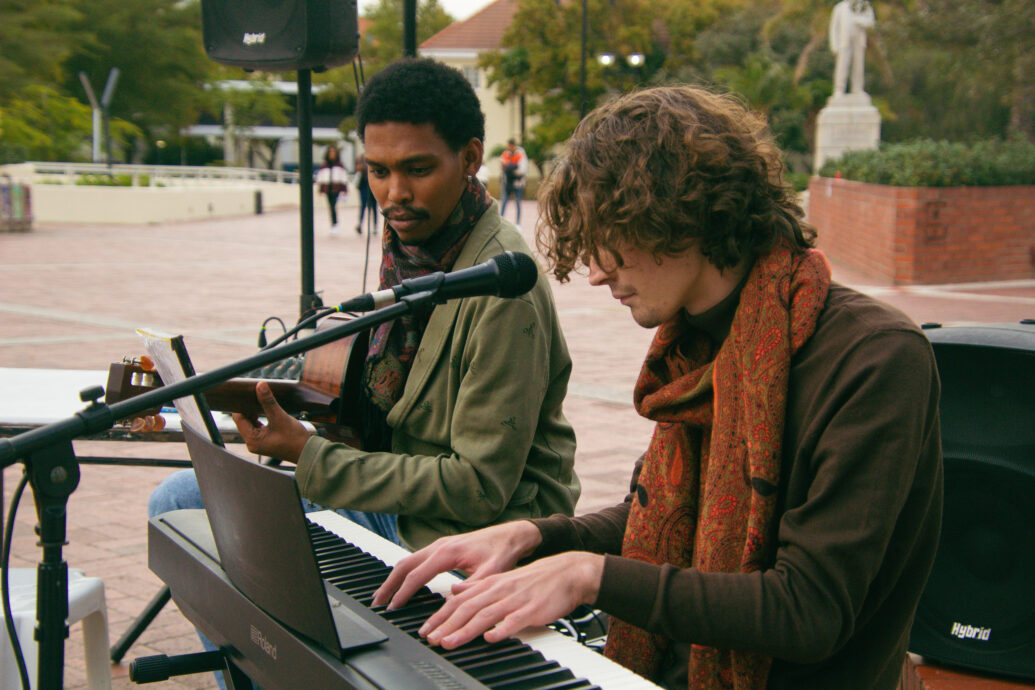
EcoMaties hosted a night market on the Rooiplein featuring various sustainable vendors and second-hand goods on Friday, 21 April. The green student society fended off the first of the weekend’s cold with fairy lights and general merriment among the vendors’ stalls. The always-lekker Almost Alive band offered live entertainment for students looking for a good thrift find, or supporting some small student businesses.
Anaïs Breytenbach, EcoMaties chairperson, explained that the point of the night market is to promote the United Nations’ (UN) twelfth Sustainable Development Goal: sustainable consumption and production.
“These are all sustainable vendors,” said Breytenbach. “It’s either people that are local producers or locally operating, otherwise with sustainable packaging or re-used products like most of the thrifting here. So promoting a circular economy, and inspiring some interest in it as well.”
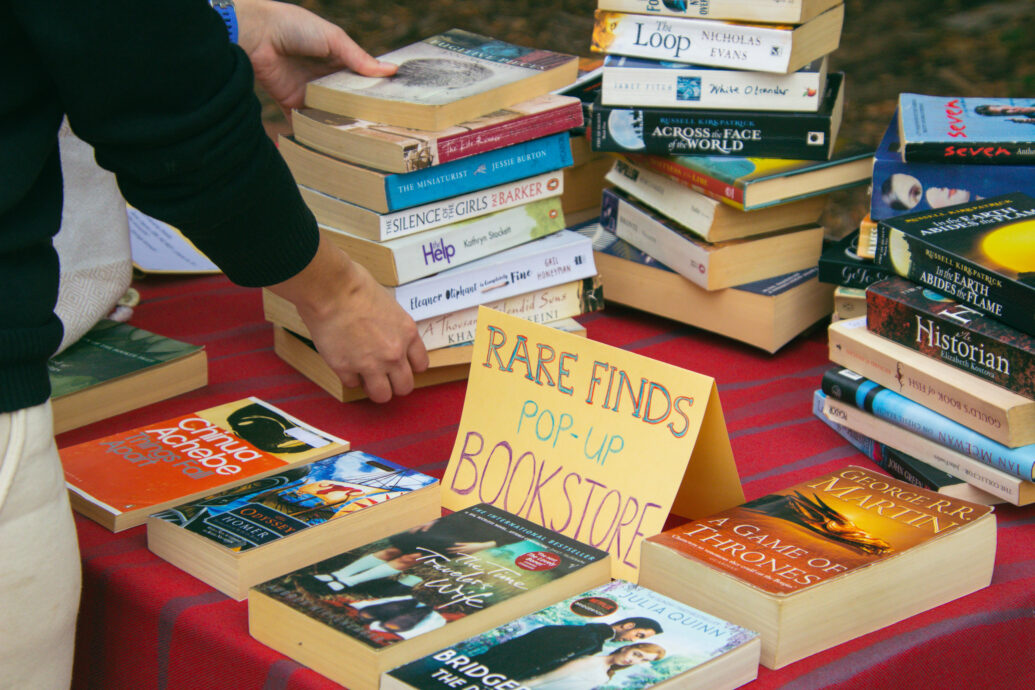
To end off the festivities of Earth Week, UNASA and Helshoogte cleaned up part of Kuilsrivier on 22 April (Saturday), “It was two hours of hard, smelly and repetitive work but I believe we truly made a difference,” said a participant.
Considering the quantity of events happening during Earth Week, the participation from students was surprisingly minimal. Anesu Karadzandima, Green HC from Nemesia, shared her thoughts on Earth Week at SU, “I believe the Earth Week of this year encompassed a wide array of activities and students were just spoilt for choice! [Whilst] some students are keen to learn more and understand the importance of thinking and acting sustainably for our future; others still do not understand the importance and others simply still do not care.”
Earth Week is a week of celebration and amplification of eco-consciousness and efforts towards sustainability. It should not, however, be the only time that these conversations are being had on campus. As Breytenbach put it, “Hopefully the lessons learnt throughout the course of Earth Week will inspire us to work on building our alliance with nature, such that every day becomes a day worthy of celebrating the Earth.”

